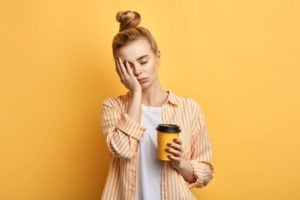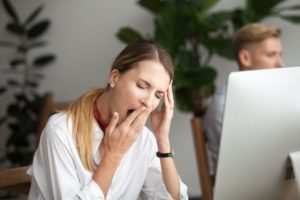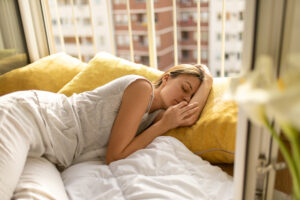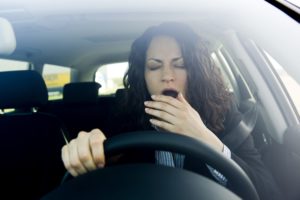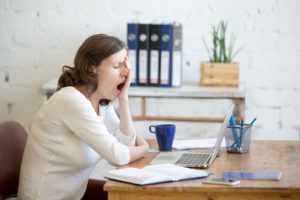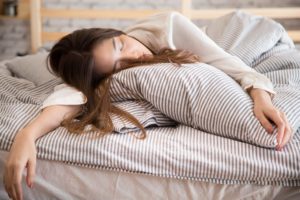Hypersomnia Treatments
Hypersomnnia is a condition where a person feels excessively sleepy during the day. Some people with hypersomnia regularly sleep between 9 to 11 hours per day or more and still feel tired. They may not feel refreshed upon waking up and feel as if they could nap any time, even while eating or talking.
A variety of circumstances can cause hypersomnia, including chronic sleep deprivation, health conditions like cancer or depression, and sleep disorders like narcolepsy or obstructive sleep apnea. There are often multiple factors contributing to excessive daytime sleepiness. In rare cases, hypersomnia cannot be attributed to an underlying health condition and a doctor may diagnose a person with idiopathic hypersomnia.
How is Hypersomnia Treated?
The main objectives of treatment for people with hypersomnia are to alleviate symptoms and improve their quality of life. Planning treatment begins by determining the cause of hypersomnia. Treatment may include a combination of medications, talk therapy, and lifestyle changes to encourage deeper sleep at night and to feel more energized during the day.
Medications for Hypersomnia
Medications for hypersomnia are used in combination with behavioral changes to promote alertness and reduce daytime sleepiness. The medication prescribed generally depends on whether symptoms are due to a sleep disorder or a different underlying health condition. Hypersomnia caused by a sleep disorder is called primary hypersomnia, while hypersomnia caused by another health condition is called secondary hypersomnia. Medications for hypersomnia should only be administered under the guidance of a physician or sleep specialist.
Primary Hypersomnia
Primary hypersomnias include excessive sleepiness caused by narcolepsy type 1 and 2, Kleine-Levin syndrome, and idiopathic hypersomnia. Sometimes referred to as central disorders of hypersomnolence, these sleep disorders are characterized by excessive sleep or daytime sleepiness that is not caused by sleep loss due to another condition.
Primary hypersomnias are typically treated with medications that help a person stay awake . These wake-promoting drugs, which can include stimulants , help a person feel more alert by affecting chemicals in the brain that regulate wakefulness and sleep.
While wake-promoting medications can help control the symptoms of hypersomnia in many people, some have the potential to cause uncomfortable side effects or be misused. For this reason, it is important for people being treated for hypersomnia to work closely with their health care team to weigh the risks and benefits of each medication and make adjustments to the treatment plan if necessary.
Secondary Hypersomnia
When a person has a medical or psychiatric condition that is causing secondary hypersomnia, treatment is focused on managing the underlying condition , which usually helps alleviate excessive sleepiness. Health problems like migraines, vitamin deficiencies, peptic ulcers, and other conditions that disrupt sleep can often be controlled with careful treatment planning.
If medications used to treat another health issue are causing excessive daytime sleepiness or periods of prolonged sleep, a doctor may adjust the original treatment plan. This may require changing the type, dose, or timing of a medication that is causing side effects. For example, it is generally recommended that sedatives be administered before bedtime and stimulants be taken during the daytime.
For some people, symptoms of hypersomnia persist while the underlying health problem is stable or well controlled with treatment. Ongoing research is investigating whether people with secondary hypersomnia from chronic health conditions like cancer, Parkinson disease, or traumatic brain injury can benefit from the use of wake-promoting medications.
Secondary hypersomnia may also be due to disorders that interfere with getting a sufficient amount of quality sleep. Treating conditions like obstructive sleep apnea , restless legs syndrome, and circadian sleep-wake disorder may help people get more restful and uninterrupted sleep.

Lifestyle and Behavior
Treatment of hypersomnia also involves making changes to sleep habits and other behaviors. Insufficient sleep is one of the most common causes of excessive daytime sleepiness, so taking steps toward improving sleep can help many people alleviate symptoms of hypersomnia. Evidence from a wide range of research suggests that diet, physical activity, daily routine, and sleep hygiene can influence how well a person sleeps.
Improve Diet and Nutrition
Food provides nutrients that support all aspects of health, including sleep. Although more research is needed to fully understand how nutrition influences sleep habits, current evidence suggests that certain foods and diets may improve sleep quality and reduce daytime sleepiness in some people.
Research has shown that eating more nuts, legumes, fruits, and unsaturated fats is associated with better sleep quality. For example, following a Mediterranean diet, which mainly consists of lean meats and plant-based foods, has been shown to improve sleep quality and lower the risk of heart disease .
Some studies have demonstrated that increased intake of saturated fats and carbohydrates, particularly in the form of added sugar , can increase feelings of excessive daytime sleepiness. Conversely, eating more protein-rich foods has been shown to improve sleep duration and reduce sleepiness. Overall, eating a wide variety of foods is associated with getting a normal amount of sleep.
People with hypersomnia may also consider adjusting the timing of meals or snacks. Research has shown that eating close to bedtime , even a nighttime snack, can negatively impact the quality of sleep.
Avoid Caffeine and Alcohol
Caffeine is a stimulant that increases the heart rate and activates the central nervous system, making a person feel energized and alert. Although many people use caffeine to ward off feelings of daytime sleepiness, it is usually advised that people with excessive daytime sleepiness should avoid caffeine , especially in the afternoons and close to bedtime.
Alcohol is a depressant that slows down activity in the brain. Some people rely on alcohol to fall asleep. However, while alcohol initially produces a sedating effect, prolonged use leads to unrefreshing sleep and increases the risk of excessive daytime sleepiness.
Engage in Regular Exercise
Exercising during the day can improve sleep for some people. Implementing a new exercise routine may be an effective method for relieving symptoms of hypersomnia. Research studies have shown that engaging in physical activities like walking, cycling, or yoga several times per week can help people with sleep disorders improve the quality of their sleep and reduce daytime sleepiness .
People with hypersomnia should also consider the timing of daily exercises. In general, exercising in the evening can make it harder to fall and stay asleep . Some experts advise that strenuous physical activities should be avoided within three hours of going to bed.
Follow a Proper Sleep Schedule
Irregular sleep schedules are associated with disrupted and insufficient sleep, one of the most common causes of hypersomnia. Improving sleep hygiene often begins with setting and following a consistent sleep schedule, going to bed and waking up at the same time every day, including weekends.
The decision of whether or not to include a daytime nap in a sleep schedule may depend upon the cause of a person’s hypersomnia and whether they are able to limit nap length. Some experts suggest that people should try to limit naps to 15 to 20 minutes, as napping longer than 30 minutes can make a person feel groggy rather than refreshed after waking.
Adopt a Daytime Work Schedule if Possible
People with hypersomnia may want to avoid working late at night or overnight. Night shift work schedules can disrupt a person’s circadian rhythms and are associated with hypersomnia. In general, working late in the evenings and being exposed to ambient light keeps the brain active, increasing alertness and making it difficult to fall asleep at the desired time.
Finding the Right Hypersomnia Treatment for You
It may take some time to find a hypersomnia treatment that works best for you. Your doctor can recommend treatment options depending on your symptoms, personal medical history, and other medications you are currently taking.
As you and your health care provider determine a course of treatment, it is important to schedule follow-up appointments to continue to evaluate your symptoms and the effectiveness of the treatment plan. The effectiveness of hypersomnia treatment can depend on the cause of hypersomnia.
When to Talk to Your Doctor
It is common to feel tired or need a nap every once in a while, especially if you have not been getting enough sleep or had a night of tossing and turning. However, if you frequently feel excessively sleepy despite getting enough sleep and if your symptoms are starting to affect your quality of life, it is time to talk to your doctor.
Tell your doctor if you have noticed other symptoms or changes in your health, including loud snoring or difficulty breathing at night. An underlying disorder such as obstructive sleep apnea or narcolepsy may be the cause behind symptoms of hypersomnia, so it is important to seek treatment.
Tips for Living with Hypersomnia
Hypersomnia can make it difficult to carry out normal daily activities at work and socially. There are a number of things you can try that may help make symptoms more manageable and improve your quality of life.
- Talk to a therapist: Cognitive-behavioral therapy (CBT) focuses on recognizing negative or unhealthy behaviors and thought patterns, and learning how to replace them with more positive ones. CBT can be used to treat conditions that contribute to excessive sleepiness like depression and insomnia.
- Find support: Support groups and online communities or message boards can help address the emotional burden of hypersomnia. Support may also include advice for dealing with its effects on work, school, and relationships.
- Exercise early in the day: Exercise is energizing, so doing so too late at night may impair sleep. Exercising in the morning instead may help improve sleep.
- Request accommodations: Educate your work colleagues and your family on your condition so they can better understand and be supportive. Schedule social events for earlier in the day so you do not have to push back bedtime.
- Avoid dangerous activities: Experts estimate that excessive daytime sleepiness contributes to 1 in 5 car accidents. Avoid driving, using heavy machinery, and other potentially dangerous activities if you feel sleepy.
- Optimize your bedroom: Keep the bedroom dark, quiet, and comfortably cool. Remove electronic devices that emit light from your bedroom.
- Calm the body and mind: Leave time before bed to help yourself transition from a state of alertness to sleepiness. A bedtime routine that involves taking a bath or drinking a warm, caffeine-free beverage can prepare your body for sleep.

Still have questions? Ask our community!
Join our Sleep Care Community — a trusted hub of sleep health professionals, product specialists, and people just like you. Whether you need expert sleep advice for your insomnia or you’re searching for the perfect mattress, we’ve got you covered. Get personalized guidance from the experts who know sleep best.
Medical Disclaimer: The content on this page should not be taken as medical advice or used as a recommendation for any specific treatment or medication. Always consult your doctor before taking a new medication or changing your current treatment.
References
20 Sources
-
A.D.A.M. Medical Encyclopedia. (2019, April 8). Idiopathic hypersomnia. MedlinePlus., Retrieved April 20, 2022, from
https://medlineplus.gov/ency/article/000803.htm -
AHFS Patient Medication Information. (2016, February 15). Modafinil. American Society of Health-System Pharmacists, Inc., Retrieved April 20, 2022, from
https://medlineplus.gov/druginfo/meds/a602016.html -
Bollu, P. C., Manjamalai, S., Thakkar, M., & Sahota, P. (2018). Hypersomnia. Missouri Medicine, 115(1), 85–91.
https://pubmed.ncbi.nlm.nih.gov/30228690/ -
Murray, B. J. (2021, November 2). Excessive daytime sleepiness due to medical disorders and medications. In T. E. Scammell (Ed.). UpToDate.
https://www.uptodate.com/contents/excessive-daytime-sleepiness-due-to-medical-disorders-and-medications -
Strohl, K. P. (2020, September). Obstructive sleep apnea. Merck Manual Professional Version., Retrieved April 20, 2021, from
https://www.merckmanuals.com/professional/pulmonary-disorders/sleep-apnea/obstructive-sleep-apnea -
Zuraikat, F. M., Makarem, N., St-Onge, M. P., Xi, H., Akkapeddi, A., & Aggarwal, B. (2020). A Mediterranean dietary pattern predicts better sleep quality in US women from the American Heart Association Go Red for Women Strategically Focused Research Network. Nutrients, 12(9), 2830.
https://pubmed.ncbi.nlm.nih.gov/32947817/ -
Melaku, Y. A., Reynolds, A. C., Gill, T. K., Appleton, S., & Adams, R. (2019). Association between macronutrient intake and excessive daytime sleepiness: An iso-caloric substitution analysis from the North West Adelaide Health Study. Nutrients, 11(10), 2374.
https://pubmed.ncbi.nlm.nih.gov/31590356/ -
A.D.A.M. Medical Encyclopedia. (2018, July 12). Mediterranean diet., Retrieved April 20, 2022, from
https://medlineplus.gov/ency/patientinstructions/000110.htm -
Zuraikat, F. M., Makarem, N., Liao, M., St-Onge, M. P., & Aggarwal, B. (2020). Measures of poor sleep quality are associated with higher energy intake and poor diet quality in a diverse sample of women from the Go Red for Women Strategically Focused Research Network. Journal of the American Heart Association, 9(4), e014587.
https://pubmed.ncbi.nlm.nih.gov/32063123/ -
Grandner, M. A., Jackson, N., Gerstner, J. R., & Knutson, K. L. (2013). Dietary nutrients associated with short and long sleep duration. Data from a nationally representative sample. Appetite, 64, 71–80.
https://pubmed.ncbi.nlm.nih.gov/23339991/ -
Crispim, C. A., Zimberg, I. Z., dos Reis, B. G., Diniz, R. M., Tufik, S., & de Mello, M. T. (2011). Relationship between food intake and sleep pattern in healthy individuals. Journal of Clinical Sleep Medicine, 7(6), 659–664.
https://pubmed.ncbi.nlm.nih.gov/22171206/ -
Schwab, R. J. (2020, June). Insomnia and excessive daytime sleepiness (EDS). Merck Manual Professional Version., Retrieved March 15, 2021, from
https://www.merckmanuals.com/professional/neurologic-disorders/sleep-and-wakefulness-disorders/insomnia-and-excessive-daytime-sleepiness-eds -
MedlinePlus: National Library of Medicine (US). (2014, June 12). Alcohol. MedlinePlus., Retrieved April 20, 2022, from
https://medlineplus.gov/alcohol.html -
Kline, C. E. (2014). The bidirectional relationship between exercise and sleep: Implications for exercise adherence and sleep improvement. American Journal of Lifestyle Medicine, 8(6), 375–379.
https://pubmed.ncbi.nlm.nih.gov/25729341/ -
Xie, Y., Liu, S., Chen, X. J., Yu, H. H., Yang, Y., & Wang, W. (2021). Effects of exercise on sleep quality and iInsomnia in adults: A systematic review and meta-analysis of randomized controlled trials. Frontiers in Psychiatry, 12, 664499.
https://pubmed.ncbi.nlm.nih.gov/34163383/ -
Brandão, G. S., Gomes, G., Brandão, G. S., Callou Sampaio, A. A., Donner, C. F., Oliveira, L., & Camelier, A. A. (2018). Home exercise improves the quality of sleep and daytime sleepiness of elderlies: A randomized controlled trial. Multidisciplinary Respiratory Medicine, 13, 2.
https://pubmed.ncbi.nlm.nih.gov/29372056/ -
National Heart, Lung, and Blood Institute. (2011, August). Your guide to healthy sleep., Retrieved April 20, 2022, from
https://www.nhlbi.nih.gov/health-topics/all-publications-and-resources/your-guide-healthy-sleep -
Wickwire, E. M., Geiger-Brown, J., Scharf, S. M., & Drake, C. L. (2017). Shift Work and Shift Work Sleep Disorder: Clinical and Organizational Perspectives. Chest, 151(5), 1156–1172.
https://pubmed.ncbi.nlm.nih.gov/28012806/ -
Shechter, A., Kim, E. W., St-Onge, M-P., & Westwood, A. J. (2018). Blocking nocturnal blue light for insomnia: A randomized controlled trial. Journal of Psychiatric Research, 96, 196–202.
https://pubmed.ncbi.nlm.nih.gov/29101797/ -
Slowik, J. M., & Collen, J. F. (2020). Obstructive Sleep Apnea. StatPearls., Retrieved April 20, 2022, from
https://www.ncbi.nlm.nih.gov/books/NBK459252/


